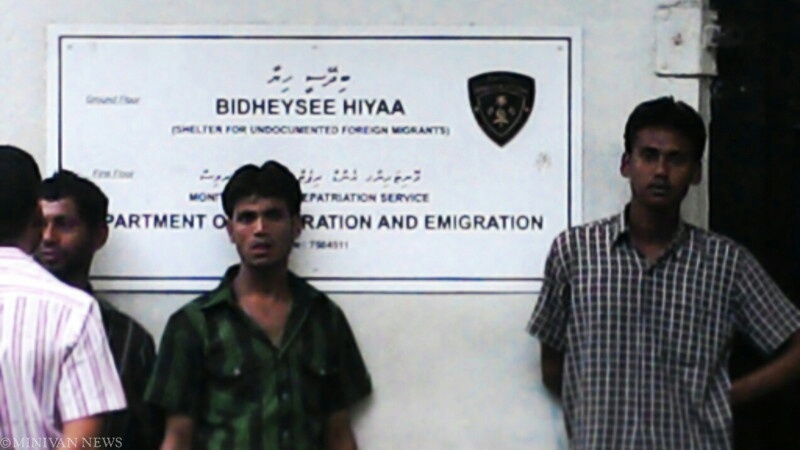The criminal court yesterday released a Maldivian man suspected of kidnapping, beating and robbing two Bangladeshi migrant workers.
Police officers broke into a second floor office apartment in Malé in the early hours of Monday morning after receiving reports of the kidnapping and arrested the 34-year-old suspect.
“Police found the two Bangladeshi men aged 23 and 24 in the apartment with noticeable bruises. Our investigations found the two Bangladeshis were robbed of a large sum of money,” said police.
The suspect was released after he was taken before a judge for extension of remand detention.
Police are searching for a Bangladeshi and a group of Maldivians suspected of involvement in the kidnapping.
Minivan News understands the Criminal Court released the suspect citing the lack of an arrest warrant authorising entry into the apartment. The court also said the suspect was not arrested from the crime scene.
However, police said “the suspect was detained at the crime scene.”
The Maldives Police Service with the help of the prosecutor general’s office has since appealed the Criminal Court’s decision to release the man.
According to legal experts, the constitution allows police to enter a private residence without a warrant under special circumstances.
“The constitution provides circumstances for police to enter a household without a warrant if they have sufficient evident of a life being threatened,” said Mohamed Shafaz Wajeeh, a lawyer.
“But establishing the circumstances in court would fall on the institution that wants to extend the period of custody.”
Speaking to Minivan News, the owner of the house in the Galolhu ward where the two Bangladeshis were held captive said the pair were kept at a leased second floor apartment.
“The police came around three in the morning. They called several times to open the door and broke in after the people inside did not respond,” she said.
“I think the Maldivian they arrested was not even sober.”
The leased apartment is the offices of Bisado Maldives, a recruitment and employment agency established in 2014, according to their Facebook page, and Brexco Private Limited, a registered construction company.
Local NGO Transparency Maldives (TM), which provides legal aid to locals and expatriates, expressed concern over the “lack of priority for foreign worker rights”.
“Expatriates are in a vulnerable situation in Maldives. It is very important that society sees and seeks the rights of foreigners at the same level as the locals,” said Ahid Rasheed, a senior project coordinator at TM.
The police also face challenges in successfully closing criminal cases involving foreign workers, the NGO noted.
“In many cases we have seen the sponsors send them back to their countries if any problem arises. So we have difficulties in judicial process, mainly in getting witness statement in courts,” a police media official said.
The former Bangladeshi High Commissioner for Maldives, Selina Mohsin, described the situation of Bangladeshi workers in the country as “bizarre and horrifying” after a spike in violence against migrant workers last month.
A Bangladeshi waiter in a local café was murdered in March and four others stabbed the following week. In 2014, police rescued a Bangladeshi held captive in a migrant workers accommodation block while a chained man was discovered by locals in 2009.
The vice president of the Human Rights Commission of Maldives Ahmed Tholal has described the recent spate of attacks against Bangladeshi workers as “hate crimes”.
